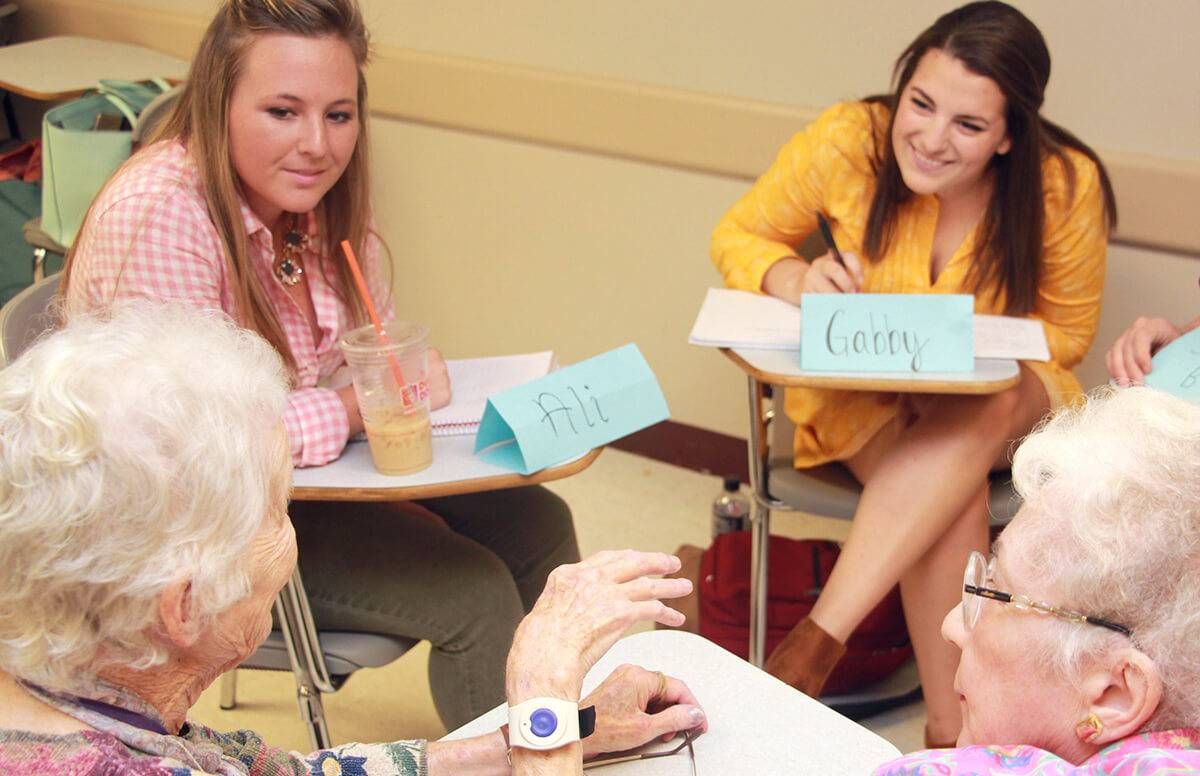Can an Intergenerational Election Discussion Change Minds?
When young and old talk politics, votes might not change, but attitudes do
In political science professor Kathleen Donovan’s Campaigns and Elections class at St. John Fisher College in Rochester, N.Y., her students have been discussing what's made the 2016 presidential election race so uniquely contentious. You know, the email hacks, the rise of fact-checking and the increasing polarization among the two major political parties. Thanks to a long-standing relationship between the school and St. John's Living residences for older adults, the class's first-time voters have help putting current events in the context of 226 years of U.S. history from people who've seen quite a bit more of it.

The result is something that hasn't happened much during the Election of 2016: civilized discussions of the important issues of our times among people with vastly different life experiences.
“For a lot of students, this is the first election they have paid any attention to, so they have no reference point,” says Donovan. “Having citizens who have experienced ‘normal’ elections as an adult is incredibly helpful.”
Living History for Students
During one discussion, Elizabeth “Bizza” Milliken explains to her younger classmates how she — much like candidate Hillary Clinton — faced resistance from her male colleagues as she rose through the ranks throughout her career as an executive. Milliken then became active in politics in retirement, first as volunteer coordinator in Democratic Congresswoman Louise Slaughter’s campaign and later as an inspection coordinator through the Monroe County Board of Elections. She admits that outside of handing out literature in support of Democratic Presidential Candidate George McGovern during the 1972 election, she never became intimately involved in the political process until later in life.
Milliken, whose husband is also in the class, is one of 10 participants from St. John’s. If any of them came in with preconceived notions of the apathetic Millennial who is too self-involved to know or care about the real issues involved in this election, those opinions quickly dissipated.
“There is a level of interest from these students that is really impressive,” Milliken says. “You don’t get the feeling that they are doing this just for the (college) credit.”
As Milliken talks about discussing the presidential debates in real time with family members through group text messages, and other residents chime in to explain how media coverage of elections has changed over the years, stereotypes the students may have of older voters melt away.
She says the age gap is much less of a factor in these political discussions than you might think. “These young people don’t talk to me like I’m an old lady,” Milliken says with a laugh.
A Deeper Understanding of the Issues
Meanwhile, another group discusses affordable health care. St. John's resident Dr. Ken Dodgson tells the students that the success of the nation’s health care system goes far beyond the contrasting visions of two presidential candidates. “If we do anything to cut down on health care costs, it is going to be your generation and the generation after you, that takes those steps,” he says.
Dodgson’s words on the importance of preventative medicine and taking responsibility for eating right, exercising and remaining mentally active sparks further conversation. The class discusses how much economic factors affect the overall health of our society, as well as an examination on whether government policies should dictate more healthy behaviors of citizens.
Donovan says her students value the opportunity to dive deeper into the subjects that matter to them while becoming exposed to informed perspectives on issues that have yet to affect their daily lives. “I know that they really enjoy having some time to discuss difficult issues in a way we don’t normally in class,” she says.
Connecting Across Generations
Resident Lucy Donofrio, who is legally blind, says being involved in programs like this helps her stay better connected with the community-at-large.
“You can feel isolated as you get older,” says Donofrio, who majored in journalism in college before starting a long career as a schoolteacher. “I join these classes to keep up with the times and to keep my mind sharp.”
She shared vivid memories of another hard-fought election from 80 years ago: the Election of 1936 between incumbent Franklin Roosevelt and Republican challenger Alf Landon.
“I remember seeing WPA (Works Progress Administration) and NRA (National Recovery Administration) signs everywhere I looked,” Donofrio says.
Milliken looks forward to each class and the opportunity to interact with these bright college students — some of whom have already volunteered in political campaigns during school breaks.
The ultimate goal of any type of intergenerational programming, of course, is to create an environment where participants of all ages leave with a meaningful experience. But in this case, the seemingly impossible has happened: “It is just citizens having an informed conversation about politics,” Donovan says. “Imagine that!”

